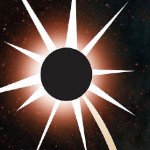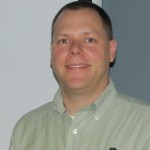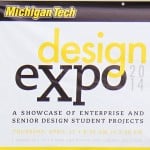 If seeing is believing, C.K. Choi (Adjunct Assistant Professor, Biomedical Engineering and Assistant Professor, Mechanical Engineering–Engineering Mechanics) has a passion for clarity—in a very tiny world. The assistant professor of mechanical engineering’s research lies at the micro-scale, in channels no thicker than a strand of hair.
If seeing is believing, C.K. Choi (Adjunct Assistant Professor, Biomedical Engineering and Assistant Professor, Mechanical Engineering–Engineering Mechanics) has a passion for clarity—in a very tiny world. The assistant professor of mechanical engineering’s research lies at the micro-scale, in channels no thicker than a strand of hair.
Read more —
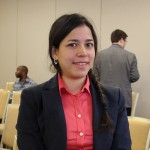
The Eleventh Annual Research Forum sponsored by the Biotechnology Research Center was held on Wednesday, Oct. 22, and Thursday, Oct. 23. Forty-one graduate and undergraduate students conducting research in life science, biotechnology, human health and related areas presented posters. Oral presentations were also given. Speakers included Jeremy Goldman (Bio Med), Ashutosh Tiwari (Chem), Hairong Wei (SFRES), Justin Segula (SFRES graduate student), Jingtuo Zhang (Chem graduate student) and Caleb Vogt (Bio Med undergrad student).
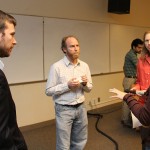 The 8th Annual 2014 D80 Conference: “Engage in Community” was held Saturday, October 11 at Michigan Tech at the Dow Environmental Sciences & Engineering Bldg.
The 8th Annual 2014 D80 Conference: “Engage in Community” was held Saturday, October 11 at Michigan Tech at the Dow Environmental Sciences & Engineering Bldg.
UPDATE: D80 Conference Website and Schedule
UPDATE: D80 Conference Agenda PDF
UPDATE: See Article D80 Conference: Students Step Up to Help the Poorest 80%
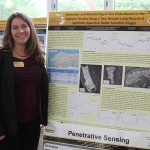 The staff of the Michigan Tech Research Institute (MTRI) in Ann Arbor was on campus on Friday, Sept. 19, to conduct a poster session in the Dow Atrium (sixth-floor campus entrance). MTRI scientists and engineers were also available to discuss projects, collaborations with Michigan Tech departments and staff, and areas of research interest. The session is intended to outline the institute’s current activities and to explore opportunities to develop new working relationships. Examples of research included: Signature Study for Vehicle-Animal Collision Avoidance, 3D Wireless Bridge Inspection, Wave-Ice sensor network, EPA Costal Wetland Mapping, Monitoring Harmful Algae Blooms (HABs) in the Great Lakes, Characterization of Unpaved Road Condition Through the Use of Remote Sensing: Road Condition Data Collection and Analysis, Application of Geospatially Enabled Geographic Response Plans for Oil Spill Response in the Western Basin of Lake Erie and more. See more examples at MTRI Posters
The staff of the Michigan Tech Research Institute (MTRI) in Ann Arbor was on campus on Friday, Sept. 19, to conduct a poster session in the Dow Atrium (sixth-floor campus entrance). MTRI scientists and engineers were also available to discuss projects, collaborations with Michigan Tech departments and staff, and areas of research interest. The session is intended to outline the institute’s current activities and to explore opportunities to develop new working relationships. Examples of research included: Signature Study for Vehicle-Animal Collision Avoidance, 3D Wireless Bridge Inspection, Wave-Ice sensor network, EPA Costal Wetland Mapping, Monitoring Harmful Algae Blooms (HABs) in the Great Lakes, Characterization of Unpaved Road Condition Through the Use of Remote Sensing: Road Condition Data Collection and Analysis, Application of Geospatially Enabled Geographic Response Plans for Oil Spill Response in the Western Basin of Lake Erie and more. See more examples at MTRI Posters
See Pictures of the MTRI Poster Session
View video clips of examples of some of the MTRI projects
MTRI, a research center of Michigan Technological University, is a recognized leader in the research, development and practical application of sensor and information technology to solve critical problems in national security, protecting and evaluating critical infrastructure, bioinformatics, earth sciences and environmental processes.
 Great Lakes Research Vessel NOAA RV 5501 at Michigan Tech: Lake Superior Joint Monitoring Program July 2014
Great Lakes Research Vessel NOAA RV 5501 at Michigan Tech: Lake Superior Joint Monitoring Program July 2014
National Oceanic and Atmospheric Administration (NOAA) provided the boat and crew and Michigan Tech provides the people who do the sampling as part of NOAA’s Great Lakes Monitoring program. Michigan Tech and NOAA share in the analysis and discovery.
 Center for Diversity and Inclusion invites the campus community to this year’s MiCUP/MI-LSAMP Research Gallery Walk, held on Thursday, June 19, from 3-5 p.m. in the Rozsa Center Lobby.
Center for Diversity and Inclusion invites the campus community to this year’s MiCUP/MI-LSAMP Research Gallery Walk, held on Thursday, June 19, from 3-5 p.m. in the Rozsa Center Lobby.
The event recognizes the research of students participating in the seven-week Michigan College/University Partnership Program (MiCUP) and the Michigan Louis Stokes Alliance for Minority Participation (MI-LSAMP) Program here at Michigan Tech.
The Design Expo highlights hands-on, discovery-based learning at Michigan Tech. More than 600 students in Enterprise and Senior Design teams showcase their work and compete for awards. A panel of judges, made up of corporate representatives and Michigan Tech staff and faculty members, critique the projects.

